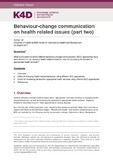Behaviour-change communication on health related issues (part two)
| dc.contributor.author | Tull, Kerina | |
| dc.date.accessioned | 2017-10-02T12:13:52Z | |
| dc.date.available | 2017-10-02T12:13:52Z | |
| dc.date.issued | 2017-08-22 | |
| dc.identifier.citation | Tull, K. (2017). Behaviour-change communication on health related issues (part two). K4D Helpdesk Report 182. Brighton, UK: Institute of Development Studies. | en |
| dc.identifier.uri | https://opendocs.ids.ac.uk/opendocs/handle/20.500.12413/13239 | |
| dc.description.abstract | Several behaviour-change communication (BCC) approaches have been effective in changing health-related behaviours, as well as increasing the demand for appropriate health services. However, limitations have been found in these approaches to varying degrees. As in the first part of this query (part one), results for this review are primarily taken from countries or regions with Islam as the dominant religion. Results from health- and nutrition-related projects using BCC are included for the following socially-conservative settings: Afghanistan, Benin, Bangladesh, Djibouti, Egypt, Ethiopia, Ghana, Indonesia, Iran, Kenya, Malaysia, Malawi, Niger, Nigeria, Pakistan, Philippines, Tanzania, Thailand, and Yemen. These groups therefore have more similar health behaviours and Islamic views on use of health services. | en |
| dc.language.iso | en | en |
| dc.publisher | Institute of Development Studies | en |
| dc.relation.ispartofseries | K4D Helpdesk Report; | |
| dc.rights.uri | https://www.nationalarchives.gov.uk/doc/open-government-licence/version/3/ | en |
| dc.subject | Health | en |
| dc.title | Behaviour-change communication on health related issues (part two) | en |
| dc.type | Helpdesk | en |
| dc.rights.holder | DFID | en |
| dcterms.dateAccepted | 2017-08-22 | |
| rioxxterms.funder | Default funder | en |
| rioxxterms.identifier.project | K4D | en |
| rioxxterms.version | NA | en |
| rioxxterms.funder.project | 0986883a-6d0f-4bb8-9c46-5e0682934d65 | en |
Files in this item
This item appears in the following Collection(s)
-
K4D [937]
K4D supports learning and the use of evidence to improve the impact of development policy and programmes. The programme is designed to assist the Foreign, Commonwealth and Development Office (FCDO) and other partners to be innovative and responsive to rapidly changing and complex development challenges.

